Does Multimedia and Image Production Count for Art Credit
It's well known that images click on social media. And they're also what we click on. In full general, posts with visuals get more than views, likes, and shares than posts that don't.
Only sourcing images for social media isn't always straightforward. The legalese establish in image copyright policies tin can be intimidating. From Attribution Noncommercial-No Derivative Works licenses to "fair use," in that location's a lot to unpack.
There's a lot at stake, as well. Breaches of copyright can land your business organisation in court with hefty fines, and "I didn't know better" won't fly as a valid defense. Peculiarly if an image is used for social media marketing. Just inquire the mother of Success Kid.
Just and so it'southward articulate – I have/would never give permission for use of my son's photo to promote any agenda of this vile man or that disgusting political party. https://t.co/AVdl9dxXCs
— Laney Griner (@laneymg) January 23, 2020
Merely one time you know the rules, it'due south easy to follow them. Plus there are several stock photo sites out at that place that make finding photos for social media stress costless.
We answer all your epitome copyright questions and share the best resources below.
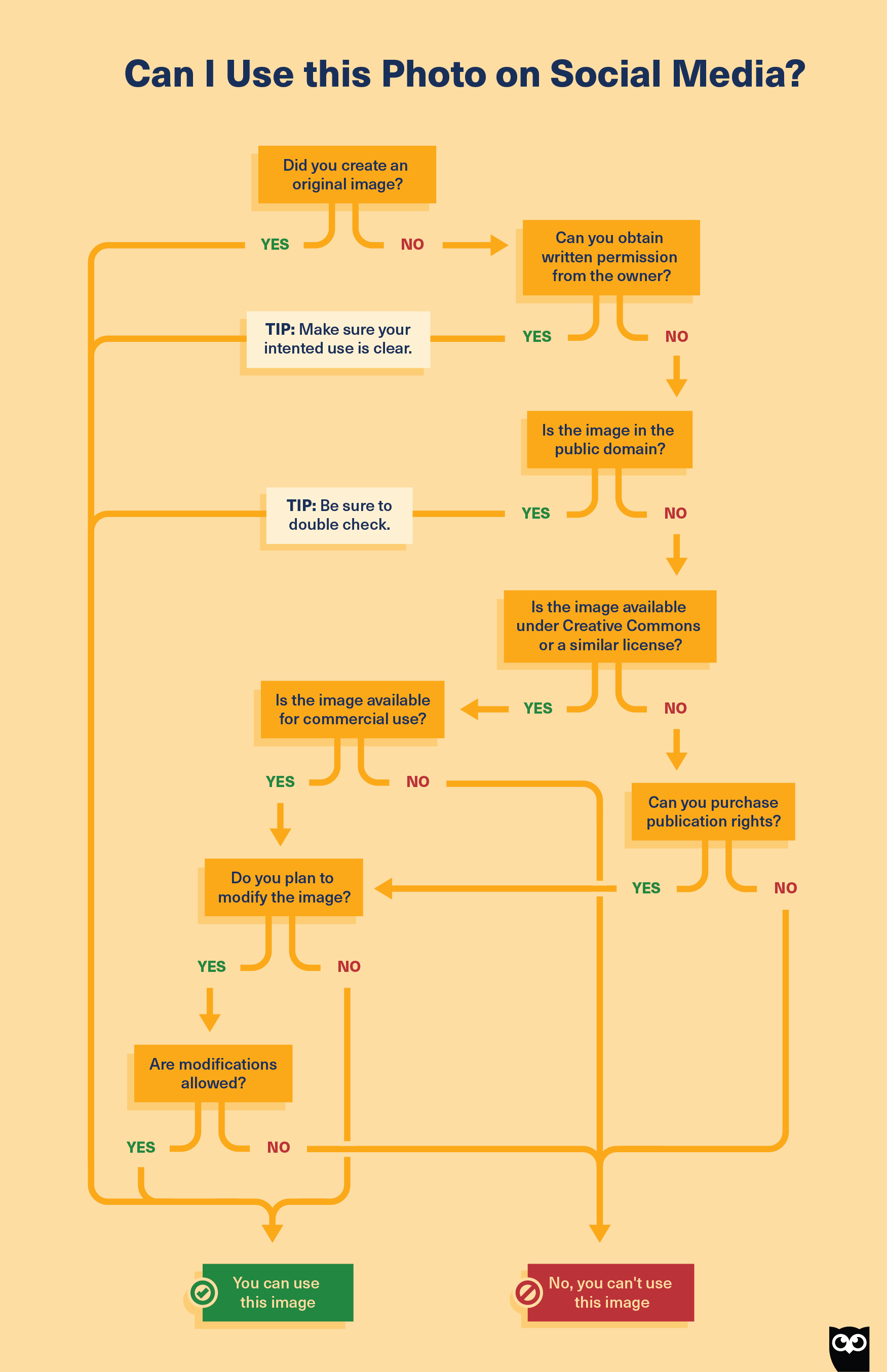
Bonus: Get the always-upwards-to-date social media image size crook sheet. The free resource includes recommended photo dimensions for every type of epitome on every major network.
What is image copyright?
Put simply, image copyright is epitome ownership. Information technology's a form of legal protection that is automatically given to a creator as soon as an image is snapped, saved, or fatigued. Photographs, digital art, maps, charts, and paintings are all fair game.
Laws about image copyright vary past state. Fortunately, 177 countries—including Canada and the United states of america—are members of the Berne Convention treaty, which sets bones copyright standards.
According to the treaty (and Canadian and U.Southward. copyright laws), a copyright possessor has exclusive rights to:
- Reproduce the work
- Brand derivatives of the work
- Display the piece of work publicly
- Distribute the work to the public
Sounds unproblematic, but it can sometimes get confusing.
Here's an example. Remember the star-studded selfie snapped on Ellen DeGeneres' telephone during the 2014 University Awards? Technically, the owner of that prototype's copyright is Bradley Cooper. Why? Fifty-fifty though he used Degeneres' phone, he took the photo.
That ways, legally, Degeneres needed to ask Cooper for permission to post the photograph. This case is popular with intellectual property lawyers, who use it to evidence that copyright ownership is non always as obvious every bit information technology seems.
If it's not your prototype, find out who created it and ask for permission to apply information technology.
Have more than questions? Bank check out the World Intellectual Property System FAQs.
What is fair use?
Fair utilize is an exception to the rule when it comes to copyright. It pertains to specific cases when copyright-protected works tin be used without permission.
Common contexts for fair apply include criticism, news reporting, instruction, or research. In these cases, the copyrighted work is typically used as reference textile, and in a way that is "beneficial to society."
Fair use rarely applies to social media marketing. In fact, Department 107 of the U.S. Copyright Deed judges fair utilise cases based on these four factors:
- Is it for commercial, not-profit, or educational use?
- Is the copyrighted work highly creative, or more than fact-based?
- How much of the work is reproduced?
- How does the use impact the potential market for the original work?
These were the exact questions asked in the instance of Graham five. Prince. In 2017, Richard Prince was sued past photographer Donald Graham, later on he printed out screenshots of Graham'due south and other Instagram posts onto canvases and displayed them in a gallery. Prince argued his cribbing art brutal under "fair apply" exemptions. But the judge ruled to the contrary, noting the work "does not make whatsoever substantial artful alterations," and was made for commercial purposes.
It's very unlikely images used for social media marketing without copyright permission volition come across fair use criteria. Remember, if you take the risk, y'all could be held responsible for breach of copyright.
What is Artistic Commons?
Creative commons is a set of licenses that turn "all rights reserved" copyrights into "some rights reserved." In other words, these licenses allow creators to requite people permission to use their works. Several sites take advantage of these permissions, including Wikipedia, YouTube, TED, and Flickr.
"Some rights reserved" licenses exercise not give someone bill of fare blanche to use content however they desire. There are different types of licenses that make up one's mind how an prototype can be used:
- Attribution Noncommercial-No Derivative Works (CC By-NC-ND): This license ways someone can use a piece of work, but they can not change it, and they tin can non make money through their utilize of it.
- Attribution No Derivative Works (CC Past-ND): A work with this license cannot be modified, merely information technology tin be used for commercial purposes.
- Attribution Noncommercial (CC Past-NC): Works may be contradistinct, just they can not be used commercially.
- Attribution (CC BY): Alterations and commercial use are okay.
- Attribution Noncommercial-Share Alike (CC BY-NC-SA): Works may be altered—but with specified limitations. Not to exist used in sales contexts.
- Attribution Share Alike (CC By-SA): Work can be altered inside limitations and used commercially.
- Public domain: If a creator has relinquished all rights, or the copyright has expired, the work enters the public domain. In Artistic Commons, this is frequently listed as CC0 one.0 Universal (CC0 1.0).
The safest options—especially if you intend to utilise images for social media marketing—are attribution-only and CC0 1.0 Universal (CC0 ane.0) public domain licenses. Recall, any license that includes the word "attribution" means that yous must give credit to the creator.
Still non sure which license to utilize? Try this license chooser.
How to tell if you tin utilize an image on social media
Social media may seem like a grey area when it comes to epitome copyright, but information technology's non.
The aforementioned rules utilise. If you want to use an image that isn't yours yous must obtain permission to use it—whether through a license or the creator straight. If you request permission and information technology's granted, go along a record on hand for time to come reference.
When someone shares an paradigm on a public account, that doesn't brand it public domain. They still own the copyright. Only there are some unique ways copyright tin exist shared on social media.
Sharing photos
If sharing is allowed on the platform, it's typically okay to share images within the platform. Retweets, reshares, repins, or posts shared to an Instagram story automatically credit the creator. Plus, these deportment are only possible if someone has enabled those account permissions.
Furniture manufacturer Commodity has an Instagram story highlight just for sharing posts or stories that tag its account.
Bonus: Get the ever-up-to-engagement social media epitome size crook sheet. The costless resource includes recommended photo dimensions for every type of paradigm on every major network.
Go the free cheat canvass at present!

Re-posting pictures in feed
Many brands repost user-generated content on sites like Instagram. But since there is no built-in characteristic that allows reposting, it'south necessary to ask for permission.
It's popular for brands to encourage people to post their photos with a branded hashtag for a hazard to be featured in the company's feed. The hashtag promotes your brand and makes it easier to find user-generated content—merely it does not count as permission.
Before reposting a photo—hashtag or no—send a DM or comment to make sure the creator is on board. Here's an instance from Adobe's Instagram business relationship:
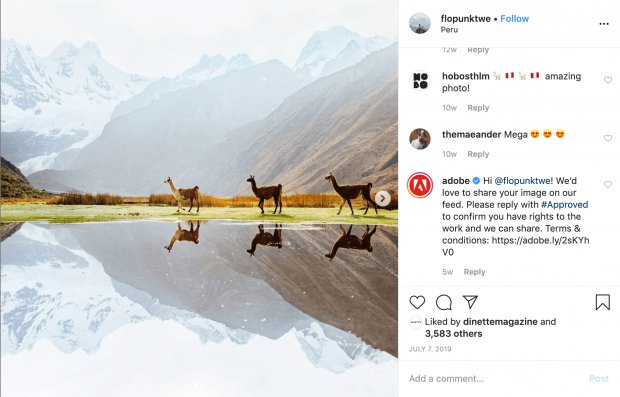
Adobe's terms and conditions tin be found here. For more examples, check out Airbnb's user-generated content terms, or Agoda's #agodaGo agreement.
Where to detect free and legal images for social media
Hither are a few photo libraries and archives that offer gratis and legal images.
Google Advanced Image Search
Google is a good place to offset a search for images, since results volition include photos from Flickr and other stock photography sites.
To starting time, go to Advanced Image Search. Fill in your keywords and specify the size, ratio, and other details as you wish. If you're unsure what sizes you'll demand for social media images, check here.
At the end of the form, select the usage rights that utilize. For social media marketing, that'due south either "free to utilise or share, even commercially," or "free to employ, share or modify, even commercially."
One time yous've establish an image you similar, click through to the page to double bank check the license.
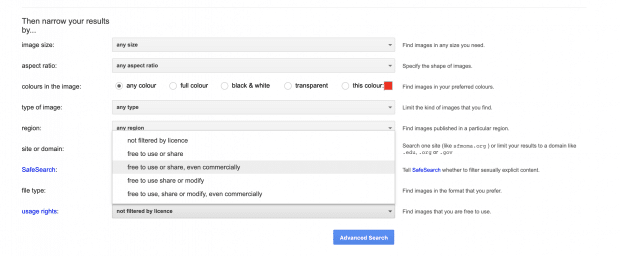
Complimentary stock photography sites
There are several free stock photography websites available. Some sites, similar Gratisography and Jay Mantri, offer a broad range of works shot by professional person photographers. Others like FoodiesFeed or NewOldStock offer niche shots of food and throwbacks.
In contempo years several stock photograph libraries accept been created to promote diversity and inclusivity on social media. Some of them are complimentary, while others have licensing fees. We've rounded some of them up here:
- 67% Drove past Refinery29 and Getty Images
- No Apologies Collection by Refinery29 and Getty Images
- Gender Spectrum Collection past Vice
- #ShowUs Collection by Dove, Getty Images, and Girlgaze
- Brewer'southward Collective Ellevate with Unsplash and Pexels
- The Disrupt Crumbling Collective by Getty Images and AARP
- The Inability Collection by Global Accessibility Awareness Day, Getty Images, Verizon Media, and the National Disability Leadership Alliance (NDLA)
Read the fine impress before using photos from a stock library. While many are free and available for use, some may have different licenses.
Creative Commons search portal
Creative Commons offers an image search portal that allows for filtering by license. Make sure to check the box that indicates you lot're looking for something yous tin use for commercial utilize. If you lot plan to modify the paradigm by cropping, calculation text, or filters, check the Change or Adapt box, too.
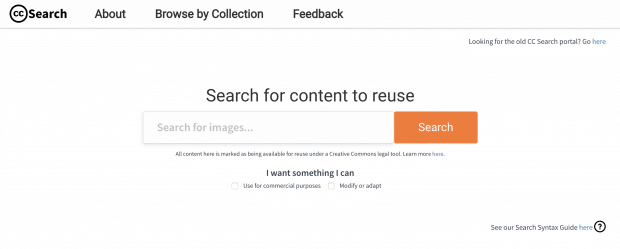
Planning to edit an prototype? Effort these 16 tools for creating quick and cute social media images.
Flickr
As a photo hosting site for professional and amateur photographers, Flickr is another expert database. Once yous've entered your search term, click on Any license. From there, select either "commercial utilize allowed," "commercial use & mods allowed," or "no known copyright restrictions."
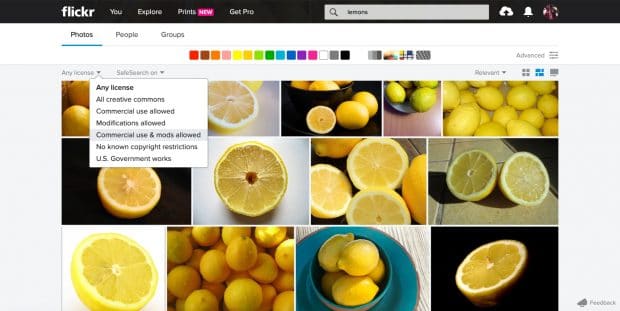
Getty Images
Getty, the world'south largest photo bureau, offers access to more than 200 million images in its archive, ranging from photography to vintage illustrations.
For at present, there are three unlike licensing models bachelor: royalty free (RF), rights ready (RR) and rights managed (RM). Soon all images will be royalty free, which is the safest bet. This license grants global usage with no expiration. It also place no limit on the amount of times the image can exist used.
These images are not free, but they are legal. And they may be worth the cost depending on the initiative.
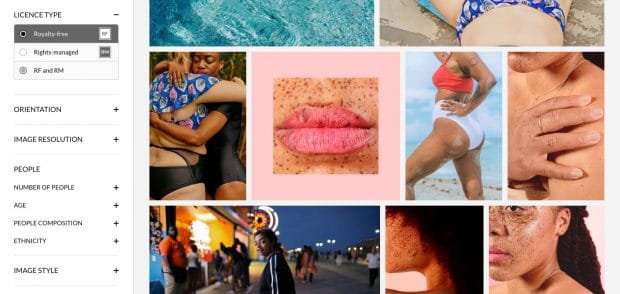
Ready to become started using legal images on social media? Here are a bunch of tips for creating engaging visual content.
Hootsuite'south social media scheduler includes an up-to-date media library with free images from Pixabay, GIPHY, and more, so you never have to worry about image copyright when posting. Try it costless today.
Get Started
Source: https://blog.hootsuite.com/understanding-image-copyright/

0 Response to "Does Multimedia and Image Production Count for Art Credit"
Post a Comment